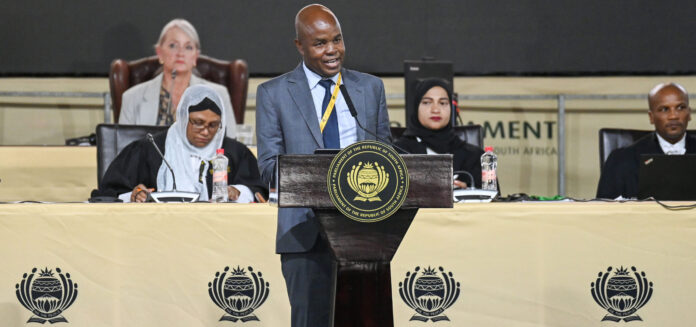The Mpumalanga government has launched a decisive crackdown on the construction mafia, moving to rescue public infrastructure projects worth over R4-billion that have been derailed by criminal interference and long-standing delays.
In a Progress Performance Report tabled before the provincial legislature on June 26, the Department of Public Works, Roads and Transport detailed new strategies aimed at
restoring order to infrastructure development.
These include deploying SAPS officers to high-risk construction sites, strengthening social facilitation efforts with local communities, and urging legislators to discourage project disruptions and contractor extortion.
“We are dealing with a deeply entrenched problem,” said George Mthethwa, spokesperson for the Mpumalanga government. “Construction mafias are a country-wide phenomenon. They threaten workers to stop unless they are paid 30%.
“Many projects have been interrupted. This is a source of the delays, not only at the
Parliamentary Village.”
Among the most visible casualties is the Mpumalanga Parliamentary Village, a R500-million development launched to provide permanent housing for members of the provincial legislature. Originally scheduled for completion in December 2024, the project remains incomplete.
While sewer lines and roads are nearly done, critical infrastructure like CCTV, access control and bulk water services has barely begun.
A departmental update from March 2025 reveals repeated site shutdowns, theft of material, and ongoing threats to workers. Although a new deadline of September 30 has been set, officials have warned that progress is far from guaranteed.
“Stability is urgently required on site to allow the contractors [to] focus on completing the project,” the report reads.
Reacting to the crisis during a recent question-and-answer session in the legislature,
Premier Mandla Ndlovu made a candid admission of the severity of the problem.
“We know the problem that is affecting us in the Parliamentary Village,” Ndlovu said.
“We have construction mafias that are hindering the progress. We said that we are declaring war and that I will lead from the front.”
Ndlovu’s comments signal a growing recognition at the highest levels of government that criminal syndicates have systematically undermined the province’s development agenda, often under the guise of local business forums demanding a stake in contracts through
intimidation.
The DA, which has repeatedly called attention to the mafia’s influence in Mpumalanga, said the report and Ndlovu’s remarks mark a shift from denial to action.
“For a long time, the DA in Mpumalanga has been calling on the provincial government to act against the construction mafia, which has crippled the construction industry and delayed infrastructure projects,” said DA MPL and public works spokesperson Teboho Sekaledi.
“We fully welcome the intervention strategies now being implemented.”
Beyond the Parliamentary Village, several other major projects have fallen prey to delays, budget overruns and criminal interference.
These include the Mpumalanga International Fresh Produce Market, where over R2-billion has been spent with no operational facility; the High-Altitude Training Centre in eMakhazeni, where since 2012 nearly R300-million has gone into land and planning without a single brick laid; and the Middelburg Hospital, which was supposed to be completed in 2020 for R1.4-billion but remains unfinished.
As part of its broader stabilisation plan, the Department of Public Works has also earmarked R141-million for pothole repairs in the 2025/2026 financial year.



